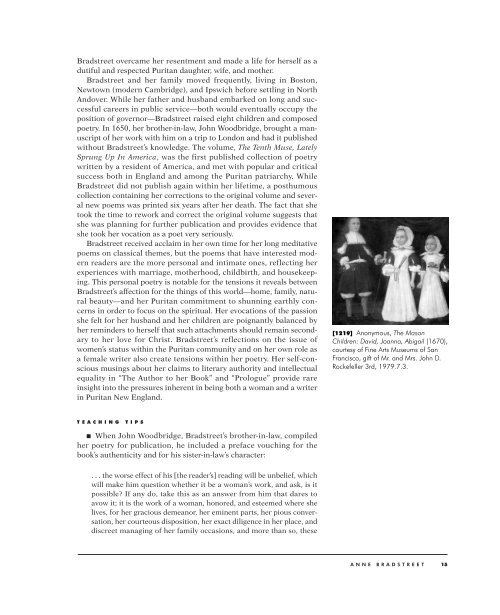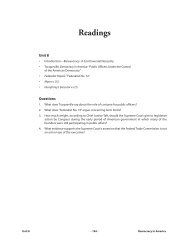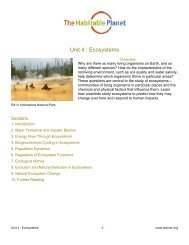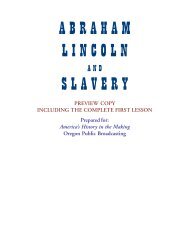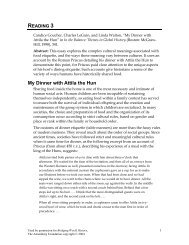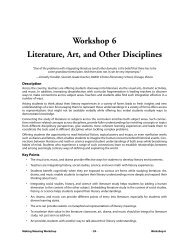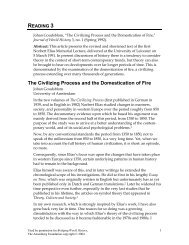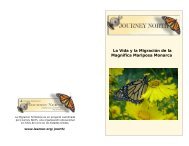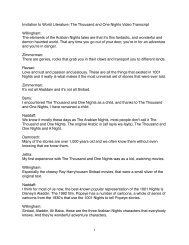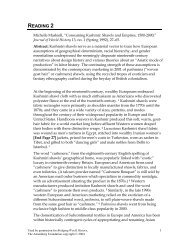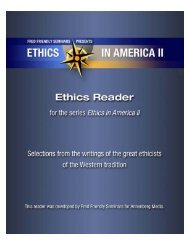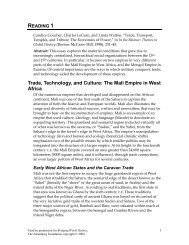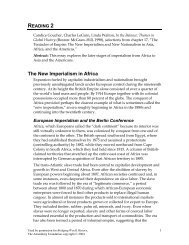UTOPIAN PROMISE - Annenberg Media
UTOPIAN PROMISE - Annenberg Media
UTOPIAN PROMISE - Annenberg Media
You also want an ePaper? Increase the reach of your titles
YUMPU automatically turns print PDFs into web optimized ePapers that Google loves.
Bradstreet overcame her resentment and made a life for herself as a<br />
dutiful and respected Puritan daughter, wife, and mother.<br />
Bradstreet and her family moved frequently, living in Boston,<br />
Newtown (modern Cambridge), and Ipswich before settling in North<br />
Andover. While her father and husband embarked on long and successful<br />
careers in public service—both would eventually occupy the<br />
position of governor—Bradstreet raised eight children and composed<br />
poetry. In 1650, her brother-in-law, John Woodbridge, brought a manuscript<br />
of her work with him on a trip to London and had it published<br />
without Bradstreet’s knowledge. The volume, The Tenth Muse, Lately<br />
Sprung Up In America, was the first published collection of poetry<br />
written by a resident of America, and met with popular and critical<br />
success both in England and among the Puritan patriarchy. While<br />
Bradstreet did not publish again within her lifetime, a posthumous<br />
collection containing her corrections to the original volume and several<br />
new poems was printed six years after her death. The fact that she<br />
took the time to rework and correct the original volume suggests that<br />
she was planning for further publication and provides evidence that<br />
she took her vocation as a poet very seriously.<br />
Bradstreet received acclaim in her own time for her long meditative<br />
poems on classical themes, but the poems that have interested modern<br />
readers are the more personal and intimate ones, reflecting her<br />
experiences with marriage, motherhood, childbirth, and housekeeping.<br />
This personal poetry is notable for the tensions it reveals between<br />
Bradstreet’s affection for the things of this world—home, family, natural<br />
beauty—and her Puritan commitment to shunning earthly concerns<br />
in order to focus on the spiritual. Her evocations of the passion<br />
she felt for her husband and her children are poignantly balanced by<br />
her reminders to herself that such attachments should remain secondary<br />
to her love for Christ. Bradstreet’s reflections on the issue of<br />
women’s status within the Puritan community and on her own role as<br />
a female writer also create tensions within her poetry. Her self-conscious<br />
musings about her claims to literary authority and intellectual<br />
equality in “The Author to her Book” and “Prologue” provide rare<br />
insight into the pressures inherent in being both a woman and a writer<br />
in Puritan New England.<br />
TEACHING TIPS<br />
■ When John Woodbridge, Bradstreet’s brother-in-law, compiled<br />
her poetry for publication, he included a preface vouching for the<br />
book’s authenticity and for his sister-in-law’s character:<br />
. . . the worse effect of his [the reader’s] reading will be unbelief, which<br />
will make him question whether it be a woman’s work, and ask, is it<br />
possible? If any do, take this as an answer from him that dares to<br />
avow it; it is the work of a woman, honored, and esteemed where she<br />
lives, for her gracious demeanor, her eminent parts, her pious conversation,<br />
her courteous disposition, her exact diligence in her place, and<br />
discreet managing of her family occasions, and more than so, these<br />
[1219] Anonymous, The Mason<br />
Children: David, Joanna, Abigail (1670),<br />
courtesy of Fine Arts Museums of San<br />
Francisco, gift of Mr. and Mrs. John D.<br />
Rockefeller 3rd, 1979.7.3.<br />
ANNE BRADSTREET 15


